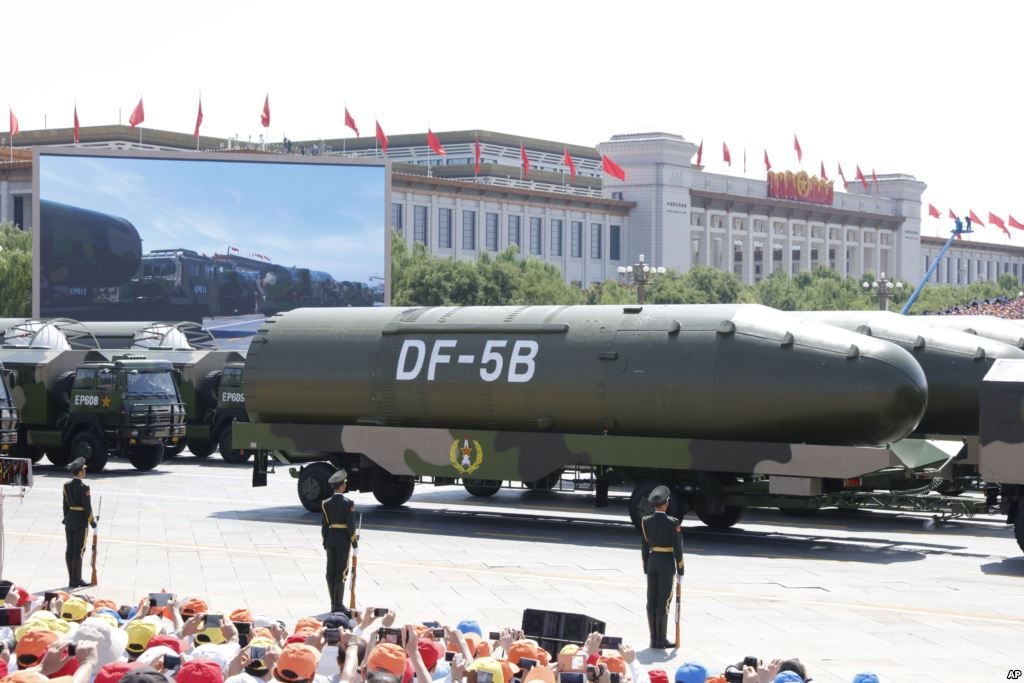AARON MEHTA

WASHINGTON: The head of Strategic Command today described China’s investments in its nuclear arsenal as a “strategic breakout” that will shortly allow Beijing to execute “any plausible nuclear” strategy it wishes to pursue.
“You’re not gonna find the definition of ‘strategic breakout’ in a doctrine or a manual — and I think it’s one of about four words in the Department of Defense that doesn’t have a definition buried in some joint pub somewhere — but it is significant and I don’t use the term lightly,” Adm. Charles Richard told an audience at the Space and Missile Defense Symposium. “Business as usual will not work.”
Richard based this warning on the fact China is boosting all areas of its missile force, including both quantity and quality of its strategic delivery systems — the “explosive growth and modernization of its nuclear and conventional forces can only be what I describe as breathtaking. Frankly, that word, breathtaking, may not be enough.”
It’s hardly the first time that Richard — who knows his way around a soundbite — has sounded the alarm about China’s nuclear modernization. But his comments are notable given the open source revelation in the last month about China’s expansion of its nuclear infrastructure.
The STRATCOM head hit on that find directly, and also gave some love to the open source researchers who discovered a tunnel complex in a region used for nuclear testing. “If you enjoy looking at commercial satellite imagery for stuff in China, can I suggest you keep looking? Right? Normally I have to pay people to do it, if you like doing it for free that just helps, and I appreciate that,” he said.
If you add up all of China’s modernization efforts, Richard concluded, “what you get is something that is inconsistent with a minimum deterrence posture. Their actions have long belied a posture more aggressive than their official policy — you’ve got to look at what they do, not what they say. And China has correctly figured out, you can’t coerce a peer — in other words, us — from a minimum deterrent posture.
“The breathtaking growth and strategic nuclear capability enables China to change their posture and their strategy,” he added. (China’s military expansion has already prompted a shift in Pentagon strategy.)
Interestingly, while seemingly arguing that nuclear modernization is part of a broader geopolitical strategy from Beijing, Richard made a point early in his speech to say his concern isn’t about why, but how to counter it.
“Look, and I know, I read the press like y’all do, there’s been a lot of speculation out there as to why they are doing all of this. I just want to say right now, it really doesn’t matter why China is and continues to grow and modernize. What matters is they are building the capability to execute any plausible nuclear employment strategy — the last brick in the wall of a military capable of coercion.”
Although China remains the major focus for everyone in the national security apparatus these days, Richard noted that the biggest nightmare for the US isn’t just Chinese nuclear modernization, but that there would be closing ties between Beijing and Moscow — leaving the US, for the first time in history, up against two nuclear competitors instead of just one.
“I think it’s a mistake to think about them in isolation of each other,” Richard noted, citing a series of recent military exercises between the two powers. “The continued defense relationship should not be underestimated or ignore, and I don’t think our national intellectual capacity has been sufficiently engaged to consider all the ramifications here.”
No comments:
Post a Comment